|
|
|
|
|
|
1. ANATOMY and SURGERY: Vesalius; Michelangelo; Da Vinci; Pare
2. MORALISTS on PAIN and FOOD; 2.1 DeVitoria; 2.2 DeLugo
3. MAGISTERIUM on ABORTION and CONTRACEPTION; 3.1. Sanchez; 3.2 Laxism; 3.3 Viva; 3.2 Sixtus V.
1.
ANATOMY
and SURGERY
1.1. ANATOMY: Andreas Vesalius (1514-1564)
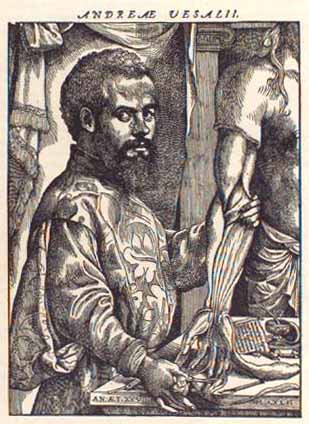 |
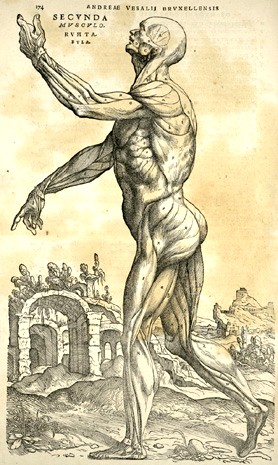 |
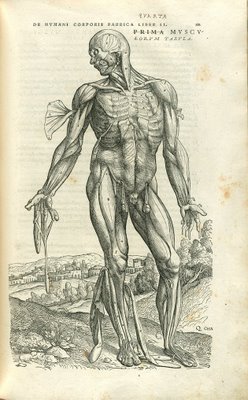 |
| Vesalius Dissecting | Human Musculature | Origins and Insertions |
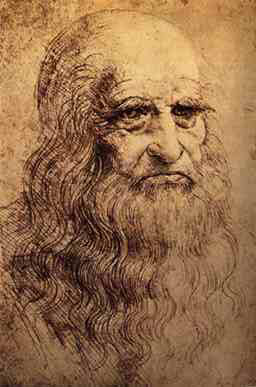 |
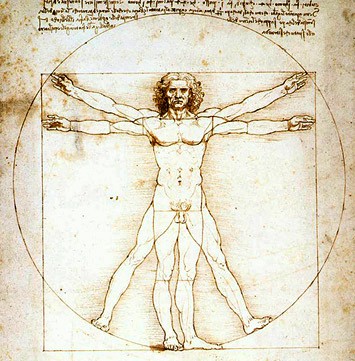 |
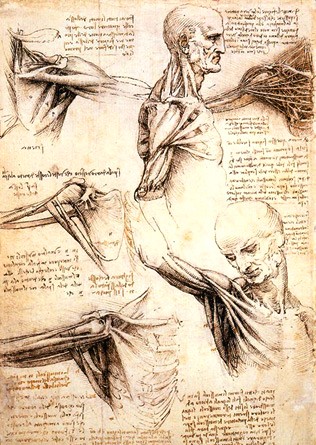 |
| Leonardo DaVinci | Vitruvian Man | Shoulder Anatomy |
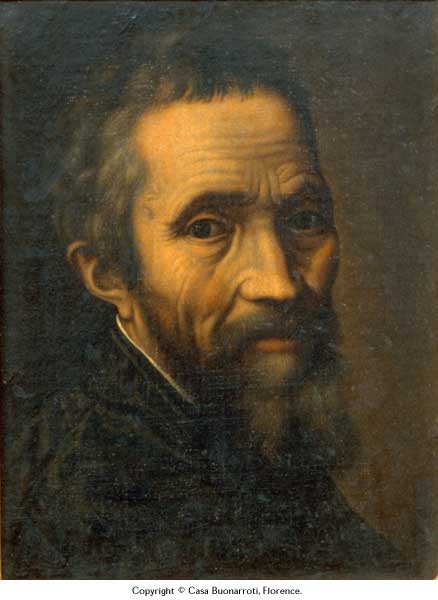 |
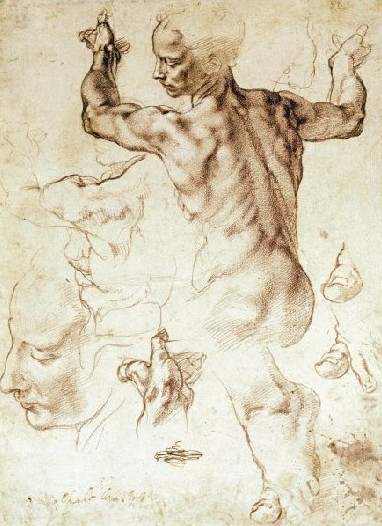 |
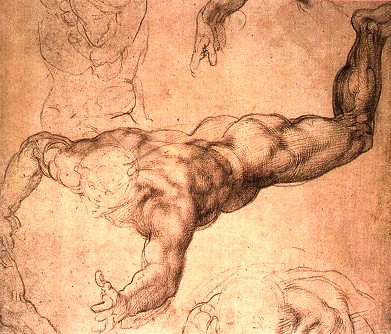 |
| Michelangelo | Sybil | Falling man |
1.2. SURGERY: Ambroise Paré (1510-1590)
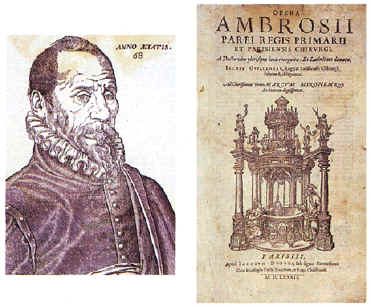 |
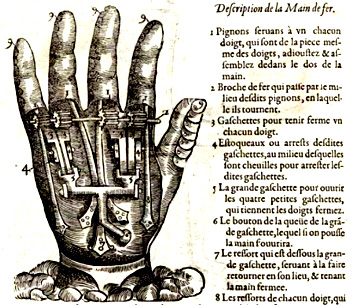 |
| Ambroise Paré | Prosthetic Hand |
2.
MORALISTS
on
PAIN and
FOOD
|
|
|
|
|
|
|
2.1
FRANCISCO De Vitoria |
|
|
|
|
|
|
|
Relectiones
Theologicae
(on the virtue of temperance
and the eating of food)
Gary
M. Atkinson, Ph.D:
Chapter 7 of Moral
Responsibility in Prolonging Life Decisions ed. by McCarthy &
Moraczewski
(Pope John Center, St. Louis, 1981,
distr. by Franciscan Herald Press Chicago),
IT is in connection with food, and its usefulness in preserving life, that Vitoria raises some points of special interest. Following Aquinas, Vitoria argues that a person has an obligation to preserve his life, based on the natural inclination toward self-preservation. Furthermore, the malice of suicide would arise from the non-preservation of oneself. But if this is so, then it would seem that a sick person who does not eat because of some disgust of food would be guilty of a sin equivalent to suicide. Vitoria denies this inference, and, in response, makes eight important points:
(1) A sick person is
required to take food
if there exists some hope of life (cum
aliqua spe vitae).
(2) But, if the patient is so depressed or has lost his appetite so that it is only with the greatest effort that he can eat food, this right away ought to reckoned as creating a kind of impossibility and the patient is excused (iam reputatur quaedam impossibilitas et ideo excusatur), at least from mortal sin, especially if there is little or no hope of life.
(3) Furthermore,
the obligation to take
drugs is even less serious. This is because food is
“per se a means ordered to the life of the
animal”
(per se medium ordinatum ad vitam animalis) and is natural, whereas drugs
are not. A person is not obliged to employ every possible means of preserving
his life, but only those that are per se intended
for that purpose (media per se ad hoc
ordinata).
(4) Nevertheless,
if one had a moral
certitude that the use of a drug would return him to health, and that he would
die otherwise, then the use of the drug would be obligatory . If he did not give
the drug to a sick neighbor, he would sin mortally, so it seems he would have
the same responsibility to save his life. Medicine is also per se intended by nature for health (medicina per se etiam ordinata est ad salutem a natura).
(5) On the other hand, it is rarely certain that drugs will have this effect, so it is not mortally sinful to declare abstinence from all drugs, though this is not a praiseworthy attitude to take since God has created medicine because of its usefulness.
(6) It is one thing not to protect or prolong life; it is quite another thing to destroy it. A person is not always held to the first.
(7) To fulfill the obligation to protect life, it is sufficient that a person perform “that by which regularly a man can live” (satis est, quod det operam, per quam homo regulariter potest vivere). Again, if a person “uses foods which men commonly use and in the quantity which customarily suffices for the conservation of strength” (quibus homines communiter utuntur et in quantitate), then the person does not sin even if his life is notably shortened thereby, and this is recognized.
| “UNCOMMON FOODS” of which DE VITORIA NEVER DREAMED |
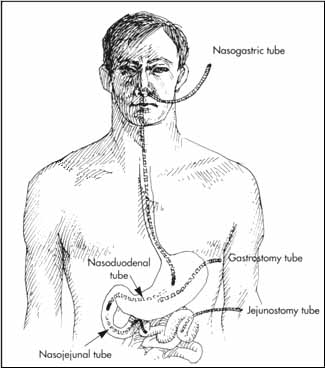 |
 |
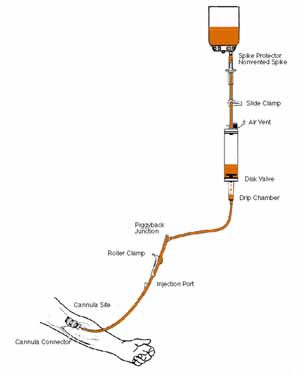 |
| Enterostomy Routes | Enterostomy “food” | IV therapy |
(8) Thus, a sick person would not be required to use a drug he could not obtain except by giving over his whole means of subsistence . Nor would an individual be required to use the best, most delicate, most expensive foods, even though they be the most healthful. Indeed, the use of such foods would be “blameworthy” (reprehensibile). Nor would one be obliged to live in the most healthful location. In another work (Comentarios a la Secunda Secundæ de Santo Tomás), Vitoria cites as examples of “delicate foods” hens and chickens. He says that if the doctor were to advise the person to eat chickens and partridges, the individual could still choose to eat eggs and other common items instead, even though he knew for certain he could live another twenty years by eating such special foods.
In a later Relectio on the question of homicide, Vitoria summarizes his position as follows: “One is not held, as I said, to employ all the means to conserve his life, but it is sufficient to employ the means which are of themselves intended for this purpose and congruent” (ad hoc de se ordinata et congruentia). This makes clear the point also made by Aquinas: that one is not obliged to use any and every means for the preservation of life.
Furthermore, Vitoria is inclined to view the obligation to use certain means not in the abstract but in the concrete. As the second point on the above list shows, what produces a “kind of impossibility” (and no one is obliged to do the impossible) need not be the means themselves but the impact of their use on the individual patient. Thus, the obligation to preserve life is neither absolute nor invariant, but rather can depend on the peculiar circumstances of the individual.
Vitoria raises the question of the relevance of the distinction between natural means (e.g., foods and drink) versus artificial means (e.g., drugs). It should not be surprising that Vitoria himself displays some ambivalence on the subject. On the one hand, (Point 3), the obligation to use drugs is less stringent than the obligation to use food because food is a means per se ordered to the life of the animal, and is natural, whereas drugs are neither. But on the other hand, (Point 4), medicine is also intended by nature for health. It would seem, then, that medicine is also natural.
Thus, natural means are intended by nature for the preservation of life, whereas artificial means are likewise intended, but only as means supplementing the natural, when this becomes necessary. Such a distinction may be able to explain some moral difference regarding the obligation to employ them, but it would also seem to permit calling artificial means obligatory under certain conditions.
|
|
|
|
|
|
|
2.1
JUAN
CARDINAL De Lugo |
|
|
|
|
|
|
|
Gary
M. Atkinson, Ph.D:
Chapter 7 of Moral
Responsibility in Prolonging Life Decisions ed. by McCarthy &
Moraczewski
(Pope John Center, St. Louis, 1981,
distr. by Franciscan Herald Press Chicago),
De Lugo deals with one topic not yet discussed in any great detail but of great interest for his predecessors and contemporaries, the question of mutilation. Agreeing with Aquinas, de Lugo held that, just as a person does not possess full dominion over his own life, so he does not possess complete dominion over the parts of his body.
THUS, arguing as Aquinas had argued, mutilations of the body are wrong if they are not necessary for the body’s health.
The question at issue here is whether certain mutilations can become obligatory, as being necessary for life or health. De Lugo holds that such a mutilation is obligatory, provided that it can be accomplished without intense pain:
He must permit this cure when
[1] the doctors judge it NECESSARY, and
[2] when it can happen WITHOUT INTENSE PAIN;(acerbissimo dolore)
NOT
IF IT IS ACCOMPANIED
BY VERY
BITTER PAIN; because
A MAN IS
NOT BOUND TO EMPLOY EXTRAORDINARY AND DIFFICULT MEANS
(media
extraordinaria et difficillima)
TO CONSERVE HIS LIFE
.12
Vitoria had insisted, (see the seventh point in summary above), that in most cases one is obliged to use only those means that are
regularly (reguariter)
and customarily (communiter)
employed for the preservation of life. Here de Lugo seems to be making basically the same point, but he chooses to phrase his position in the negative, that one is not obliged to employ extraordinary or out-of-the-ordinary means for the preservation of life. Thus, de Lugo is saying that the difference between not-saving and overt killing is morally important if the means being refused are either difficult to employ or out of the ordinary. He uses, as an example of means difficult to employ, a mutilation causing intense or bitter pain (intenso acerbissimo dolore). Indeed, a means may be out of the ordinary precisely because it is painful to employ.
| . . . He must permit this cure when the doctors judge it necessary, and when it can happen without intense pain; | debere earn curationem permittere, quando medici necessarium judicarent, et absque intenso dolore fieri posset; |
| not, if it is accompanied by very bitter pain; | secus si acerbissimo dolore fieret; |
| because a man is not bound to employ extraordinary and difficult means to conserve his life.' | quia non tenetur homo media extraordinaria et difficillima adhibere ad vitae conservationem . . .*-- |
|
J. De Lugo, De Justitia et Jure, |
Disp. 10, Sect. I, n. 21. |
Nevertheless, it is important to recognize that there may be a number of reasons why a means may be out of the ordinary, other than that it is difficult to employ. Thus de Lugo considers many of the examples of optional means earlier mentioned by Vitoria: the use of choice and costly medicine, or even the drinking of or abstaining from wine.13 Indeed, one senses in de Lugo a striking attempt to be most liberal in judging a means to be optional. Any reason that would make a means out of the ordinary suffices for de Lugo as a justification for calling it optional. And he is quite willing to relativize this element of the extraordinary (as Vitoria was with the element of the burdensome) to the particular circumstances of the individual. Thus de Lugo argues that a novice in a religious order is not bound to return to the secular world in order to eat better food to preserve his life, since such food, even though ordinary and common for the secular world, is not ordinary for those in the religious life.
De Lugo holds that the failure to employ available means necessary for preserving one’s life or the failure to avoid a potentially death-dealing natural cause can be morally equivalent to the positive taking of one’s own life. But this is true only where the means are ordinarily employed and not difficult to use, or where the death-dealing natural cause can easily be avoided.
In the previous discussion the opinion of Vitoria argued that a sick person is required to take food to preserve his life, at least if the food can be employed without great difficulty. But Vitoria adds a further qualification: for the taking of food to be obligatory, there must exist “some hope of life.” The implication there is that a person is not obliged to employ means if there is no hope of their being useful in preserving life.
De Lugo is in agreement with Vitoria on this point and employs an example which will be discussed by later moralists and will be seen to have considerable theoretical and practical significance for the present day. De Lugo considers the case of a man facing certain death in a burning building. The man notices that he has water to extinguish part of the fire, but not all of it, and that he can only delay his death by the water’s use. Is the man under an obligation to use the water? De Lugo answers in the negative, “because the obligation of conserving life by ordinary means is not an obligation of using means for such a brief conservation -- which is morally considered nothing at all” (quae moraliter pro nihilo reputatur)
On the other hand, de Lugo holds that if the person could put out the fire completely, he would be obliged to use it. In this latter case, the use of water would be analogous to eating ordinary foods. Certainly the use of water is an ordinary means of putting out a fire (and so saving a life). And, in the example, the means can be easily employed. Thus, de Lugo wished to admit the possibility that an ordinary means need not be obligatory because the benefit to the person is too slight to carry moral weight.
|
|
|
|
|
|
|
3.
THEOLOGIANS
and
MAGISTERIUM |
|
|
|
|
|
|
|
OBSTETRICAL EMERGENCY ["Therapeutic Abortion"]
from Jones, The Soul of the Embryo, ch. 12, Prob Sins and Indir, Excep. pp. 181
3.1. Thomas Sanchez (1550-1610)
[The moral theologian] Thomas Sanchez (1550-1610) revived the distinction drawn by Antoninus of Florence (concerning abortion before or after ensoulment) but combined this with the use of Antonius of Cordoba for abortion after ensoulment. He proposed that before ensoulment an embryo could be aborted directly to save the mother’s life, but after ensoulment there could be no direct abortion although there could the use of medicina salutifera that caused a miscarriage indirectly.
This view attracted a following including such figures as Paul Layman (1574-1635), Trullencli (d. 1644) and Antonius Diana (1585-1663). However, it was also attacked vigorously by Leonard Lessius (1554-1623), Basilio Pontius (1569-1629), John de Lugo (1583-1660) and others.
At this stage in the debate
everyone accepted the legitimacy of indirect abortion, in the sense of taking life-saving medicines even if they had the side-effect of causing a miscarriage.
Also, everyone was agreed that it was wrong directly to abort an embryo alter ensoulment.
What was controversial was whether it was legitimate directly to abort an embryo prior to ensoulment.
Antoninus had seemed to find this acceptable, but he did not have the advantage of a clear distinction between direct and indirect abortion. Sanchez had said yes, but he faced some difficult questions. If direct abortion was allowed to save the mother’s life before ensoulment, why was it not allowed after ensoulment? Sanchez replied that before ensoulment the embryo was not a separate being but was part of the body of the mother (pars viscerum mulieris). However, if this were the case, why could the embryo not be aborted for other reasons prior to ensoulment? Sanchez answered that abortion is justified when the foetus directly threatens the mother’s life as a quasi aggressor, like a diseased limb, but if the threat comes from some other cause it would not be right to harm the embryo. (Here we see an echo of the doctrine of Maimonides.) But this line of argument brings us back to the place where we started. If the embryo can be called a quasi -aggressor before ensoulment, why can it not be called a quasi-aggressor after ensoulment?) Thus, if direct abortion is permissible before ensoulment, it seems that it would be permissible after ensoulment. Yet it was agreed by all that direct abortion was not permissible after ensoulment, therefore it seemed that neither should it be permissible before ensoulment. Over time, especially after 1679 [with the condemnation of Laxism - see 3.3 below], the position of Sanchez gradually lost its support.
|
|
3.2. POPES Sixtus V(1588)
-
Effraennatam; |
|
from Jones, The Soul of the Embryo, ch. 5, Medicinal Penalties, pp. 71-72
IN 1588, in a decree called Effraennatam, Pope Sixtus V invoked the power of excommunication in an attempt to restrain the growing practice of abortion during the Renaissance. As his model he took the Decretals V.I2.5 and imposed the sanction not only for abortion but also for administering contraceptive drugs. He also reserved the ability to lift the excommunication to the pope alone. The condemnation of abortion as homicide was not in any way novel. However, several aspects of the excommunication were novel:
[1] it was promulgated to the whole Church (not just in one diocese or region);
[2] it was reserved to the pope to be able to lift the excommunication (not to a local bishop);
[3] and it included contraception as well as abortion.
This meant that any abortion and any use of contraception anywhere in the Church had to be reconciled personally by the pope. Unsurprisingly, such a discipline proved wholly unworkable.
THREE years later Pope Gregory XIV in his constitution Sedes Apostolicae greatly reduced the scope of this excommunication:
[1] placing the power to lift it with the local bishop,
[2] abandoning the attempt to include contraception
[3] and narrowing the excommunication so that it covered only abortion of a formed foetus.
Gregory’s legislation remained in place until 1869 [...]
3.3. [Magisterial] Condemnation of Laxism (1679)
The development of casuistry in the seventeenth century saw a great profusion of opinions on various ethical matters from the very cautious (rigorist) to the very permissive (laxist). In 1679, in an attempt to identity the limits of reasonable debate, the Holy Office condemned a set of 65 extreme laxist propositions. Two concerned abortion.
34. It is permissible to procure abortion before the ensoulment of the foetus lest the girl known to be pregnant be killed or disgraced.
35. It seems probable that all foetuses in the womb lack a rational soul and that they first begin to have one when they are born. Consequently it must be said that abortion never involves homicide.
The first proposition was apparently defended by Torreblanca (d. 1645), but it was associated with Sanchez inasmuch as several theologians argued that it followed from his position. This was in spite of the fact that Sanchez himself limited abortion before ensoulment to the situation where there was an intrinsic and serious health threat to the mother’s life.
The second proposition, that the rational soul is given at birth, was defended by John Marcus, physician-general of the kingdom of Bohemia. Ensoulment at birth, with the first breath, was originally proposed by the Stoics, but does not seem to have found any supporters in the Christian tradition until Leonardo da Vinci.
By the mid seventeenth century there were various views about the timing of ensoulment[:]
[1] The opinion of Thomas Aquinas taken from Aristotle, giving 40 days for males and 90 (or 80) days for females, continued to have a major following.
[2] Others preferred Hippocrates’ estimate of 35 days and 42 days or
[3] Augustine’s figure of 46 days for both sexes.
[4] Fiemus and Zacchia had proposed that ensoulment occurred at or within a few days of conception.
Nevertheless, the idea that ensoulment did not occur until birth was unprecedented in the Christian ethical tradition and shocking even to the most liberal minds of the age. Caramuel Lobkowicz (1606-82), himself dubbed the ‘prince of laxists’ described the opinion as not only improbable but also intolerable.
3.4. Dominic Viva (1648-1726)
The two condemned propositions do not touch on the question of abortion to save the mother’s life. The evaluation of such procedures, and the circumstances, methods or intentions which served to justify them, was a matter left for discussion among theologians. Rome was concerned, at this time, only to condemn the most extreme positions. Nevertheless, theologians such as Dominic Viva (1648-1726) attempted to draw out the implications of these condemnations. This had the effect of reinforcing the view that direct abortion was never legitimate, even in the case of an embryo before ensoulment. Viva emphasized that early abortion should still be regarded as homicide in some sense: imperfect homicide. He also drew the analogy with the emission of seed. No theologian at the time accepted that it was legitimate for a man to emit seed outside the context of generation for the sake of his health. The destruction of seed contradicted the nature of generation and was forbidden on that basis (here we see again a similarity with Jewish thought). Direct abortion of an embryo before ensoulment was an even more serious sin, being a step closer to true or perfect homicide.
This Webpage was created for a workshop held at Saint Andrew's Abbey, Valyermo, California in 2002